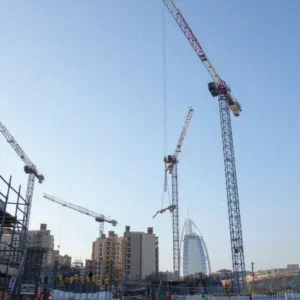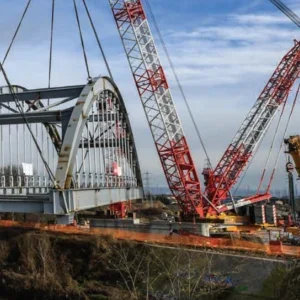Select Plant’s cranes business makes up £60m, a quarter of the company’s total turnover. Managing director Paul Collins says although he has concerns about the effect bad credit might have on the building industry, there are plenty of big civil and infrastructure projects in the London region alone, including the Olympics, Crossrail commuter railway project and M25 ring road widening. In the UK, the operation takes about half of its business from internal operations from general contractor Laing O’Rourke, and also from external business. Select operations director Syd Appleyard was recently appointed head of the UK Construction Plant-hire Association’s Tower Crane Interest Group. Select has recently set up an Australia operation headed up by Paul Ward, and currently runs about 30 cranes.
Paul Collins says that the company continues to see demand for high-capacity tower cranes. Part of this demand comes from prefabricated modules, which reduce labour on site, and are lower-cost and easier to manage in fabrication and also installation. Select Plant tower cranes installed 1,500 prefabricated bathroom pods at the Atlantis Hotel on Dubai’s Jumeirah Palm Island. The company’s biggest project in the Middle East is the 11km-long (7mi) Al Raha Beach waterfront development in Abu Dhabi, UAE. There are 20 cranes there now, and another 30 to come in the next year. The project is a Aldar-Laing O’Rourke joint venture.
Select distributes Terex-Comedil tower cranes, a relationship it has had for 15 years. Collins says that Select is the company’s biggest customer in terms of revenue, and the Comedil tower cranes are a good mixture of quality and price.
Select Plant is unusual in the UK because it sells off Comedil tower cranes once they reach seven years of age (although its stock of Peiners are older). This is part of a Select corporate policy that takes into account health and safety issues, as well as optimising reliability, says general manager Duncan Salt. Select has similar policies for other types of equipment; it disposes of its crawler cranes after 10 years, and it is looking at a six-year lifetime for its mobile cranes, although the company’s oldest are currently only four years old. The company’s mobile crane business began in 2003, originally to help erect the tower cranes, but now is looking to go external. It currently has 10-12 mobiles on hire.
The company is rolling out a system of RFID tags on its tower crane fleet to help track tower sections (it has about six types), and also to help plan new purchases. It has developed tracking software in-house.






